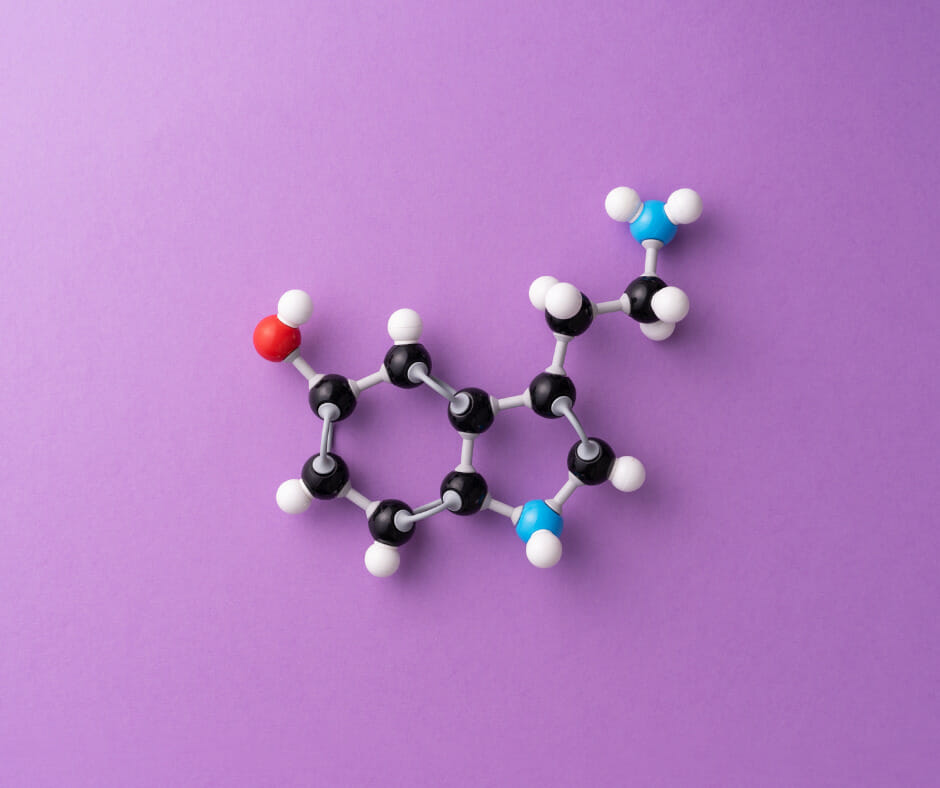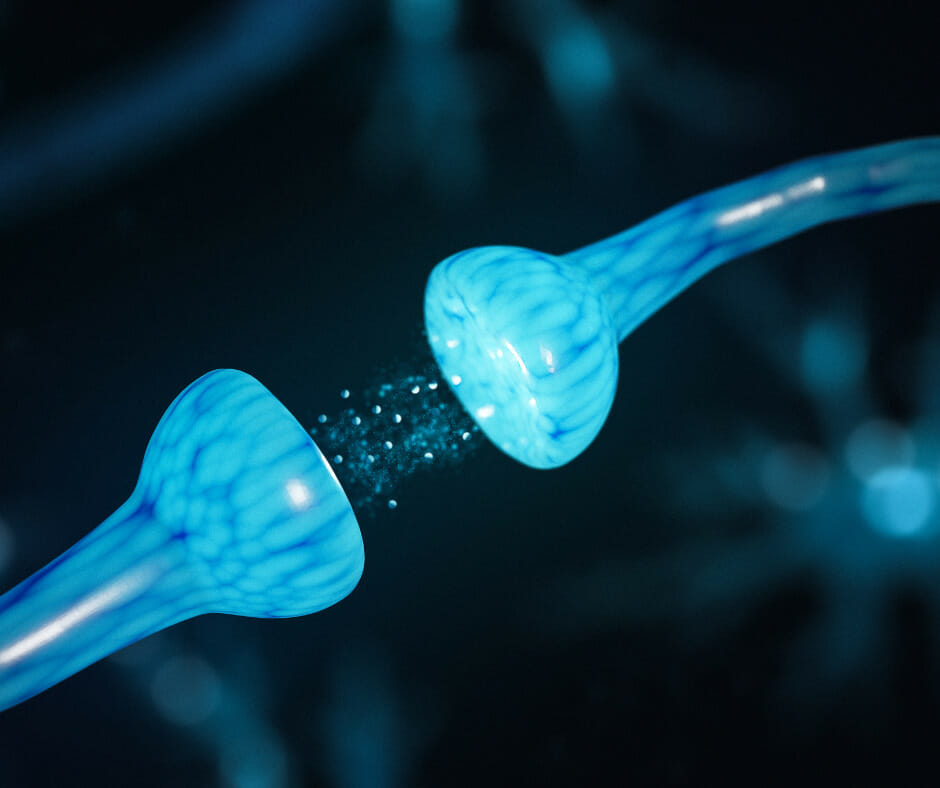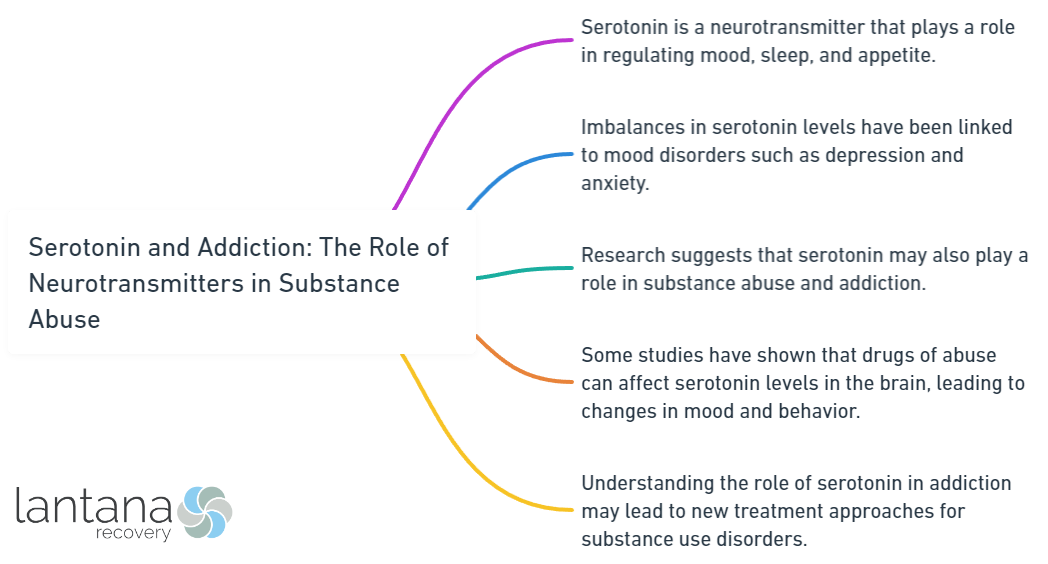Serotonin, a neurotransmitter primarily associated with mood regulation, plays a crucial role in addiction. Understanding the interplay between neurotransmitters and substance abuse is essential in comprehending the complex mechanisms of addiction. Several reputable sources, including the National Institute on Drug Abuse, have extensively studied the connection between serotonin and addiction, shedding light on the importance of neurotransmitters in substance abuse.
Neurotransmitters are chemical messengers that facilitate communication between nerve cells in the brain. In the context of addiction, neurotransmitters play a significant role in reward pathways and the experience of pleasure. By modulating brain activity, these neurotransmitters can influence addictive behaviors and contribute to the development and maintenance of addiction.
Specifically, serotonin, known for its role in regulating mood, plays a pivotal role in substance abuse. As a neurotransmitter, serotonin helps regulate emotions and behaviors, including impulsivity, stress response, and mood. Imbalances in serotonin levels can lead to increased susceptibility to addiction, as individuals may turn to substances to compensate for deficient serotonin activity or seek the enhanced pleasure that substances can provide.
Substance abuse can have profound effects on serotonin levels in the brain. The use of certain drugs can disrupt the normal functioning of serotonin, leading to alterations in mood, sleep patterns, and overall well-being. These changes in serotonin levels can contribute to the reinforcing effects of substances and the cycle of addiction.
Understanding the role of serotonin and neurotransmitter imbalances in addiction has significant treatment implications. Targeting serotonin levels through pharmacological interventions, therapy, and lifestyle modifications can potentially aid in addiction recovery. Modulating serotonin activity offers promising avenues for addiction treatment, as it can help restore balance and alleviate cravings and withdrawal symptoms.
By examining the intricate relationship between serotonin and addiction, researchers and healthcare professionals can continue to develop effective strategies for preventing substance abuse and supporting individuals on their path to recovery.
Understanding Neurotransmitters and Substance Abuse
Understanding the role of neurotransmitters in the top addictions in the world is essential for comprehending addiction mechanisms. Neurotransmitters play a critical role in transmitting signals within the brain, regulating mood, emotion, and behavior.
An imbalance of neurotransmitters can contribute to substance abuse disorders. Drugs and alcohol disrupt the functioning of neurotransmitters, causing alterations in mood, cognition, and reward pathways.
Dopamine plays a key role in the brain’s reward system and is closely linked to addiction. Drugs and alcohol increase dopamine levels, reinforcing addictive behaviors.
Serotonin, another important neurotransmitter, regulates mood, sleep, and appetite. Imbalances in serotonin are associated with mood disorders and substance abuse, particularly in individuals with depression or anxiety.
GABA and glutamate are neurotransmitters that work together to regulate brain excitability. Drugs and alcohol can disrupt the balance of these neurotransmitters, leading to either relaxation or increased excitability.
Prolonged substance abuse can have a significant impact on neurotransmitters, causing long-term changes that disrupt the regulation of mood, behavior, and cravings. This perpetuates the cycle of addiction.
The understanding of neurotransmitters in substance abuse has paved the way for targeted treatments. Medications such as SSRIs or drugs that target dopamine receptors have proven helpful in overcoming addiction.
By gaining a deeper understanding of how neurotransmitters are involved in substance abuse, researchers and healthcare professionals can develop more effective interventions and treatments for addiction.
What are neurotransmitters?
Neurotransmitters are chemicals that play a crucial role in neuron communication in the brain. What are neurotransmitters? They transmit signals across synapses, allowing information to be passed between neurons. Neurotransmitters regulate mood, emotions, cognition, and physical processes.
The main purpose of neurotransmitters is to transmit signals and facilitate neuron communication. They bind to specific receptors on the receiving neuron, triggering a response. Different neurotransmitters have different effects on the brain and body.
Some common neurotransmitters include serotonin, dopamine, and GABA. Serotonin regulates mood, hunger, and sleep. Dopamine is associated with pleasure and reward. GABA inhibits neuron activity, promoting relaxation and reducing anxiety.
Understanding neurotransmitters is essential in addiction because drugs can affect their function. Drugs can mimic neurotransmitter effects or interfere with their normal functioning, leading to changes in brain chemistry and potentially addictive behaviors.
How do neurotransmitters influence addiction?
Neurotransmitters play a crucial role in addiction by influencing the brain’s reward system. So, how do neurotransmitters influence addiction? Well, let’s take a closer look.
Dopamine, a neurotransmitter linked to pleasure and reward, is closely associated with addiction. When drug use or addictive behaviors occur, it causes intense feelings of pleasure. This is what drives individuals to continue their addictive habits.
Another important neurotransmitter is serotonin. It regulates mood, sleep, and appetite. Low levels of serotonin have been connected to impulsivity and depression, which increases the risk of addiction.
GABA, on the other hand, acts as an inhibitory signal. It helps to maintain balance in the brain. However, chronic drug use disrupts this balance, leading to increased excitability and stress sensitivity.
Lastly, we have glutamate, which is involved in learning and memory. It is associated with drug tolerance. This means that with prolonged drug use, the brain becomes less responsive to the effects of the substance, leading to an increase in dosage or frequency of use.
Understanding the influence of these neurotransmitters is crucial for effective addiction treatment. By targeting specific systems and restoring balance in the brain, we can help individuals recover and overcome their addiction.

The Role of Serotonin in Substance Abuse
Serotonin, a crucial brain neurotransmitter, has a significant role to play in substance abuse. It effectively regulates an individual’s mood and emotions. Any disturbance in serotonin levels can contribute to substance abuse as Serotonin (5-HT) plays a crucial role not only in maintaining synaptic plasticity throughout our entire life but also in influencing our emotional well-being, motivation, reinforcement processes, and learning and memory abilities as stated by Müller and Homberg in The role of serotonin in drug use and addiction, from Behavioural Brain Research, 2015.
When serotonin levels are higher, they promote happiness and overall well-being, which in turn decreases the desire for substances. Conversely, lower serotonin levels can result in depression and anxiety, consequently increasing the likelihood of engaging in substance abuse.
Moreover, serotonin profoundly influences the brain’s reward system, which is intrinsically linked to addiction. The consumption of drugs or alcohol triggers the release of serotonin, generating pleasurable sensations and reinforcing the urge to continue using substances. Impulse control is also influenced by serotonin, and decreased levels compromise judgment and self-restraint, making it more challenging to resist substance abuse.
Specific substances have the ability to modulate serotonin levels and impact the brain’s capacity to regulate it effectively. For instance, MDMA and LSD induce a surge of serotonin release, briefly heightening mood but potentially depleting serotonin levels over time.
Understanding the pivotal role that serotonin plays in substance abuse is crucial for developing effective interventions and treatments. By diligently targeting serotonin receptors and levels, it may be possible to reduce cravings and enhance recovery outcomes.
Nevertheless, it is important to recognize that serotonin is only one aspect of addiction, and a comprehensive approach encompassing various factors is necessary for successful treatment.
What is Serotonin and its Function in the Brain?
Serotonin is a neurotransmitter that plays a crucial role in the brain. It helps regulate mood, emotions, and sleep patterns. It is synthesized from the amino acid tryptophan and is primarily found in the brain and gastrointestinal tract.
Serotonin, also known as 5-hydroxytryptamine (5-HT), has multiple functions in the brain. It regulates mood by influencing happiness, contentment, and well-being. It is also involved in appetite, memory, cognition, and sleep.
In the brain, serotonin binds to receptors and transmits signals between brain cells. It acts as a messenger for mood, emotions, and cognitive functions.
A deficiency in serotonin, also known as serotonin deficiency, is associated with mental health conditions like depression and anxiety disorders. Low levels of serotonin contribute to feelings of sadness, irritability, and disrupted sleep.
Understanding serotonin’s function is important for addiction. Substance abuse disrupts neurotransmitter balance, including serotonin. Drugs and alcohol can temporarily increase serotonin levels, boosting mood. However, prolonged substance abuse depletes serotonin, leading to depression and mood disorders.
True story: Sarah, a young woman battling addiction, overcame severe depression by understanding the role of serotonin in the brain. Therapy and medication helped Sarah learn how serotonin imbalances contribute to mood disorders. By focusing on healthy lifestyle changes and appropriate treatment to restore serotonin levels, Sarah overcame addiction and improved her mental health.
How Does Serotonin Affect Substance Abuse?
Serotonin plays a significant role in substance abuse in several ways. “Serotonergic drugs are widely used in psychiatric disorders, abused as recreational drugs and liabilities in the serotonergic system have been identified as important etiological factors in many prevalent disorders” (An Update on the Role of Serotonin and its Interplay with Dopamine for Reward, Fischer & Ullsperger, 2017):
1. Regulation: As a neurotransmitter, serotonin helps regulate mood, emotions, and behavior. When serotonin levels are low, individuals may turn to substance abuse as a means to artificially increase serotonin and experience pleasure.
2. Cravings and withdrawal symptoms: The abuse of substances can cause a surge in serotonin levels, leading to intense cravings. However, when substance use is halted, serotonin levels can plummet, resulting in withdrawal symptoms such as anxiety, depression, and irritability.
3. Impulsivity and decision-making: Serotonin impacts impulse control and decision-making. Reduced serotonin levels are associated with greater impulsivity, which contributes to risky behaviors such as substance abuse.
4. Co-occurring disorders: Substance abuse often occurs alongside mental health disorders such as depression and anxiety. These disorders frequently involve dysfunction in serotonin, suggesting a link between mental health and substance abuse.
It’s important to recognize that serotonin is just one piece of the addiction puzzle. Treating addiction necessitates addressing various factors, including psychological, social, and environmental aspects.
Pro-tip: If you suspect a substance abuse issue, it is crucial to seek professional help. Therapy and medication can address underlying problems, restore serotonin balance, and facilitate long-term recovery.

Neurotransmitter Imbalance and Addiction
In the early 20th century, research on neurotransmitters and their role in addiction was just beginning. Scientists were discovering the connection between brain chemistry and substance abuse. As researchers delved deeper into neurotransmitter imbalances, they made groundbreaking discoveries that revolutionized addiction treatment. Today, our understanding of neurotransmitters in addiction has led to more effective therapeutic approaches, giving hope and support to those struggling with substance use disorders.
How does an imbalance of neurotransmitters contribute to addiction?
The imbalance of neurotransmitters contributes to addiction. Neurotransmitters are chemical messengers in the brain that regulate functions like mood, reward, and motivation. An imbalance in these neurotransmitters can lead to addictive behaviors and substance abuse.
One key neurotransmitter involved in addiction is dopamine. Dopamine is associated with pleasure and reward, and drugs or substances of abuse can cause a surge of dopamine in the brain. This surge creates a euphoric feeling, reinforcing the desire to repeat the behavior for more pleasure.
Another neurotransmitter involved in addiction is serotonin. Serotonin helps regulate mood, emotions, and impulse control. Imbalances in serotonin levels can contribute to depression, anxiety, and other mental health disorders, which can be a factor in developing addiction as individuals turn to substances for relief.
Gamma-aminobutyric acid (GABA) is an inhibitory neurotransmitter that helps regulate brain activity. Chronic substance abuse can disrupt GABA function, leading to increased excitability in the brain and decreased impulse control.
Glutamate is an excitatory neurotransmitter that plays a role in learning, memory, and reward pathways. Imbalances in glutamate can lead to increased sensitivity to stress and cravings, making it harder to quit addictive substances.
The imbalance of these neurotransmitters creates a cycle of addiction, where the brain becomes dependent on substances to maintain balance. Understanding the role of neurotransmitter imbalance in addiction can inform treatment approaches, such as medications that target specific neurotransmitters to restore balance and reduce cravings.
It is essential to remember that each individual’s journey is unique when dealing with addiction. Recovery is possible with proper support, therapy, and personalized treatment plans from Lantana Recovery.

Effects of Substance Abuse on Serotonin Levels
Substance abuse has a significant impact on serotonin levels in the brain, which play a crucial role in regulating mood, appetite, and sleep. When individuals engage in drug and alcohol abuse, the natural balance of serotonin is disrupted, resulting in a variety of effects.
One of the consequences of substance abuse is the decreased production and release of serotonin, leading to symptoms such as depression, anxiety, and mood swings. These lower serotonin levels contribute to the negative emotional state experienced by those struggling with substance abuse.
Another effect of substance abuse is impaired serotonin reuptake. Certain substances hinder the reuptake process of serotonin, causing an accumulation of this neurotransmitter in the synapses. Initially, this leads to a boost in mood and a sense of euphoria. However, long-term abuse depletes serotonin levels, exacerbating the negative consequences of substance abuse.
Moreover, substance abuse can desensitize serotonin receptors, altering their sensitivity to serotonin. This desensitization results in a reduced response to natural serotonin, leading to tolerance development and the necessity for higher doses of the substance to achieve the same effect.
Lastly, substance abuse disrupts the normal functioning of serotonin pathways, influencing mood regulation and mental health. This disturbance in serotonin pathways further contributes to the negative effects of substance abuse.
The specific impacts of substance abuse on serotonin levels can vary depending on the substance used, the dosage, and individual factors. It is crucial for individuals struggling with substance abuse to seek professional help and treatment from us, a Charleston Drug Rehab Center, to address their addiction and restore healthier serotonin levels.
Treatment Implications: Targeting Serotonin for Addiction Recovery
Targeting serotonin for addiction recovery has important treatment implications. Serotonin plays a critical role in our brain’s reward system, mood regulation, and impulse control. By focusing on serotonin levels, we can significantly impact addiction recovery outcomes as increasing evidence suggests that prolonged exposure to drugs of abuse may disrupt the serotonin system, potentially explaining the frequent coexistence of affective disorders (like depression) with drug dependence which was explained by Kirby et al., in Contributions of Serotonin in Addiction Vulnerability.
To incorporate serotonin targeting into addiction treatment, several suggestions can be considered:
1. Utilize medications: Medications such as selective serotonin reuptake inhibitors (SSRIs) can regulate mood and reduce cravings by increasing serotonin levels in the brain.
2. Explore behavioral therapies: Cognitive-behavioral therapy (CBT) is an effective approach that helps individuals identify and modify negative thought patterns, leading to healthier behaviors and reducing the risk of relapse.
3. Integrate exercise: Regular physical activity enhances serotonin production, leading to improved mood, reduced stress, and overall well-being, which are essential for addiction recovery.
4. Adopt a healthy lifestyle: Making healthy lifestyle choices, such as maintaining a balanced diet, getting enough sleep, and effectively managing stress, contributes to optimal serotonin levels. This, in turn, supports addiction recovery and promotes mental health.
By targeting serotonin for addiction recovery, individuals can enhance their chances of achieving long-term sobriety and overall well-being. It is crucial to collaborate with healthcare professionals to develop a personalized treatment plan that caters to individual needs and goals. With the implementation of appropriate strategies, successful addiction recovery is attainable. You can also explore initiatives or programs like the Half of Us Addiction Initiative to learn more about mental health and addiction.
Can modulating serotonin levels help in treating substance abuse?
Yes, modulating serotonin levels can be beneficial for treating substance abuse. Numerous studies have indicated that individuals with substance abuse disorders often have imbalances in serotonin levels. These imbalances can result in heightened cravings, impulsivity, and depression, making it challenging to overcome addiction. However, by modulating serotonin levels, we can restore balance and alleviate these symptoms.
Increasing serotonin levels can help reduce drug cravings and improve overall emotional well-being. This support is vital in assisting individuals to overcome addiction and maintain sobriety. However, it is important to note that modulating serotonin levels alone may not be sufficient for complete recovery. A comprehensive treatment plan should involve counseling, behavioral therapies, and support systems.
Frequently Asked Questions
How does serotonin imbalance lead to addiction and withdrawal symptoms?
Serotonin, a neurotransmitter, plays a critical role in mood, appetite, digestion, memory, and sexual function. Imbalances in serotonin levels can disrupt these functions and lead to addiction and withdrawal symptoms. When serotonin levels are low, individuals may seek substances that increase serotonin, such as drugs or alcohol, to temporarily alleviate symptoms. However, prolonged substance use can further disrupt serotonin levels and exacerbate addiction and withdrawal symptoms.
What role do brain circuits play in addiction and substance abuse?
Brain circuits involved in pleasure, learning, stress, decision-making, and self-control are impacted by substance abuse and addiction. The basal ganglia, which controls reward and learning based on rewards, experience a surge of the neurotransmitter dopamine when addictive drugs are used. Over time, these circuits adapt and become less sensitive to dopamine, leading to tolerance and the need for higher amounts of the substance to achieve the desired effect. Changes to these circuits also affect an individual’s ability to experience pleasure from ordinary rewards, making life less enjoyable without the substance.
What are the effects of compromised self-control on addiction?
In individuals with addiction, the prefrontal cortex, responsible for judgment and decision-making, becomes disrupted. This disruption leads to a reduced ability to control impulses towards alcohol or drug use, even when individuals know that stopping is in their best interest. The compromised self-control explains why individuals with addiction struggle to quit and often experience relapse. The constant craving triggered by cues in their life erodes their resolve and makes it challenging to resist substance use.
How do neurotransmitters like serotonin and dopamine contribute to addiction?
Dopamine, a neurotransmitter involved in pleasure and reward, is released in the basal ganglia when using addictive drugs. This release creates a rewarding high and trains the brain to associate substance use with other cues in a person’s life. Serotonin, another neurotransmitter, plays a role in mood and emotional well-being. Imbalances in serotonin levels can lead to addiction, as individuals may seek substances that increase serotonin to alleviate symptoms. The interaction between serotonin and dopamine in the brain contributes to the development and reinforcement of addiction.
What are some natural ways to release serotonin and support mental health?
There are several natural ways to release serotonin and support mental health. Regular exercise, spending time in nature, and practicing meditation or yoga are known to boost serotonin levels. Engaging in social interactions and pursuing activities that bring joy and fulfillment can also increase serotonin production. Additionally, maintaining a balanced diet that includes food sources rich in tryptophan, a necessary chemical for serotonin production, can support optimal serotonin levels.
Where can I find professional addiction treatment resources?
If you or someone you know is struggling with addiction, it is essential to seek professional help. Reach out to Lantana Recovery today for a personalized treatment plan.










